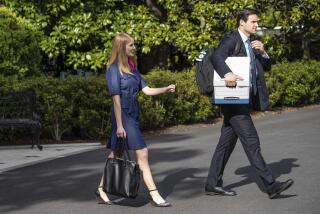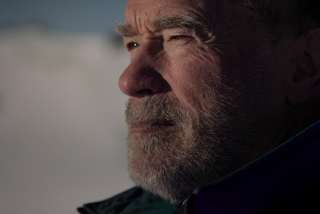Did Not Want to Know, Currie Says
WASHINGTON — Betty Currie had suspicions. Her “gut” told her, she said, that something might be amiss in the Oval Office, a few feet from her strategically placed desk.
But President Clinton’s secretary--a devoted churchgoer described as “everybody’s aunt”--did not want to know the racy details that all America has been learning the last several weeks.
Currie’s grand jury testimony in the Clinton case suggests that, more than just about anybody, she should have known that the president was carrying on an affair with former White House intern Monica S. Lewinsky.
As detailed by her own words and other information gathered by independent counsel Kenneth W. Starr and released Friday, Currie delivered love letters and gifts, then retrieved some of them. She set up meetings between the president and Lewinsky, sometimes lingering not far away. She listened patiently when Lewinsky threw fits because she did not think she was getting enough attention from Clinton.
Yet Currie, 58, insisted that she did not know what was going on or have any desire to know. Although her testimony provided Starr with key details of Clinton’s trysts with Lewinsky, prosecutors could never make her turn on her boss.
“I didn’t want to know anything or be able to say I knew anything,” she told the grand jury.
She Had No Desire to Look Closely
Sure, Lewinsky had more access than any other intern. She kept calling and visiting and writing. And she cried and carried on about a man she called “Handsome.”
But Currie wore blinders and had no desire to use the peephole on the door to the Oval Office. Her official job title is personal secretary to the president, and when she is not typing or faxing or answering phones, she is just that, Clinton’s personal secretary.
“There is no job description, per se, so the duties are just varied,” Currie testified about her $60,000-a-year position. “You do what’s to be done.”
It was no easy task running interference for this odd couple. She reported to work on a Saturday to facilitate one Lewinsky date with Clinton. Early this year, Currie fielded a midnight telephone call from the president telling her to check out the Drudge Report, the online newsletter in which public word of the Lewinsky matter first surfaced. She endured awkward leading questions from the president when the secret began to get out.
“There was a crush of some sort,” Currie told prosecutors, who grilled her on several different days this year about how much she knew. Still, she said, “I didn’t have any inklings of sex.”
Currie, however, did have inklings that this intern was unlike any other. And she knew to take precautions. When she connected the couple by telephone, she dialed Lewinsky’s home number herself, avoiding the White House operators, who made a record of all calls.
“What I was trying to do was allow the president to have personal and private phone calls if he wanted to,” Currie said. “And the appearance of impropriety, I didn’t want to have it.”
Prosecutors then asked whether she believed there was actual impropriety occurring in the Oval Office.
“I had a feeling,” she testified, “but I had nothing to base it on other than a gut.”
Currie, of course, knew that every White House intern did not get in to see the president.
“To your knowledge,” prosecutors asked her, “was there ever at any time any other intern that had a relationship like the one Monica and President Clinton had?”
Currie, who first worked for Clinton in his 1992 presidential campaign, said no.
Three Kinds of White House Aides
One particular passage from her testimony perhaps best captured Currie’s attitude toward the Lewinsky-Clinton relationship.
Prosecutors wanted to know if Lewinsky had ever told Currie that, as long as no one had witnessed the couple in an intimate moment, “then nothing happened.”
At first, Currie could not recall such a conversation. Pressed by prosecutors, she asked for a break.
“My memory is a little better--but not much,” Currie then testified. “If that was said, I would have said, ‘Stop, stop. I don’t want to hear any more.’ ”
In her conversations with investigators, Linda Tripp said Lewinsky had described three kinds of White House aides in the context of her affair with the president.
There were the “protectors,” who would shoo her away from the Oval Office. They included Evelyn Lieberman, the deputy chief of staff who sent Lewinsky to work at the Pentagon; and Nancy Hernreich, who was director of Oval Office operations.
In fact, to avoid Hernreich altogether, Currie would arrange for Lewinsky’s visits at 7 p.m. on Tuesdays, when Hernreich was at her yoga class, according to Tripp, whose testimony also was released Friday.
There were the “helpers,” those who aided Lewinsky in getting access to sensitive areas of the White House and dispensed intelligence on Clinton’s location.
Then there were the “facilitators,” such as Currie, who helped make the whole thing possible.
Tripp said Lewinsky told her she courted all the helpers and facilitators she could find.
But sometimes Lewinsky drove Currie up the wall.
Asked at one point by prosecutors if Lewinsky was a pain in the neck, Currie said: “I remember her bugging me a lot.”
“She was a good kid--excuse me, a young lady,” Currie said. “She was very kind to me on various occasions, but she would get frustrated and she would yell and scream and carry on. So then she would turn back to being nice again.”
Currie seemed to consider all this part of her vague job responsibilities. But, though she seldom complained, sometimes even she got fed up.
One day in mid-January, a Newsweek reporter called her about Lewinsky, an early sign that the secret relationship was not going to stay under wraps. Along with Lewinsky, she headed to the office of lawyer Vernon E. Jordan Jr., an old friend, seeking advice and fearing the worst.
“I had the world’s worst headache . . . and I thought I was going to die.”
More to Read
Sign up for Essential California
The most important California stories and recommendations in your inbox every morning.
You may occasionally receive promotional content from the Los Angeles Times.










